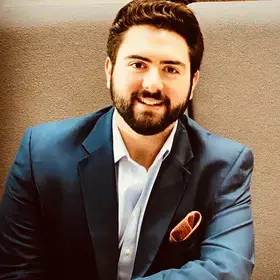By Shana Childs (’14JRN)
Two years ago, technology executive Isaac Linson had a new business idea. He’d created Tapuya Brands, a company that uses proprietary technology to acquire Amazon native products and turn them into consumer-valued brands beyond the platform. But starting a company was the easy part. Understanding how to leverage technology to grow it sustainably, however, would be a challenge.
Linson needed hands-on feedback from successful technology entrepreneurs who’d started businesses before. “I wanted to learn more about how to scale technology from successful entrepreneurs and leaders in their industries,” he says. “I found the Executive M.S. in Technology Management program and fell in love.”
After going from $0 to more than seven figures in revenue in less than a year, Tapuya was purchased by Pilot Wave Holdings, where Linson continues to purchase e-commerce brands as a partner at the firm. In an interview, Linson explains the value of his Columbia degree. Excerpts follow.
What led you to pursue an executive master's degree? Why Columbia?
I was drawn to Columbia's reputation and specifically, the intersection between technology and any type of business. I loved the structure of the Executive Technology Management program because I would get a specific mentor who’d previously found success in scaling technology. Not only was I able to get the education I was looking for, but the program also offered the chance to build substantive relationships with graduates and scholar-practitioner faculty. Plus, I’d be able to leverage every class in building my business.
The mentorship component was the big reason why I chose this program; I wanted to connect with successful entrepreneurs who have done well after Columbia. My mentor and fellow Columbia Executive Technology Management graduate, Giri Devanur, was by far the best part of my experience. Learning his thought process and getting inspiration from his energy was something that really helped me. Like me, Giri actually built his own business while in the Technology Management program, so right off the bat I thought, ‘I have to do what he did.’
How are the mentors assigned to you?
Students submit a Capstone Project proposal, then a mentor from a group of 250 chooses you based on their alignment with the scope of your project. Funnily enough, I didn't want to leave it up to chance. There was a panel of mentors that came to speak to the class and one of them was Giri. I told him directly, ‘I know you're supposed to choose me, but I want you to be my mentor because what you did was awesome. You're a serial entrepreneur.’ I don’t think I’d benefit as much from a corporate executive, so I kind of refused to take no for an answer!
What were the highlights of the program? How did it help you to build your business?
There were two main classes that helped. One was Accounting and Finance for Technology and the other was the Executive Seminar. In the Executive Seminar, students built a business plan with close guidance and feedback from an experienced entrepreneur; the entrepreneur, who’s also a professor, helps students to think through how to build not just their businesses, but how to pitch them.
Tell us more about Tapuya Brands, which you built at Columbia.
Prior to launching Tapuya, I’d spent three years as a technology consultant leveraging technology to help small businesses convert into profitable e-commerce outfits. In a crowded technology solution market, I noticed that many of my clients struggled with determining which software would deliver the most ROI for them. They also needed education on how to manage and scale with software.
At Tapuya Brands, we buy e-commerce businesses to help them grow not just on Amazon, but wherever consumers shop. It started with the question, “How does, for example, a 24–35-year-old woman who lives in an urban area and makes over six figures shop for her dog online?” We use proprietary technology to identify the products that the target consumer currently purchases on Amazon. Then we contact the owners and discuss partnership or purchase strategies. Our overall goal is to deliver the newly-purchased product or brand beyond the current consumer—wherever they shop.
My team is comprised of seasoned brand creators, storytellers, and successful operators of many types of businesses; we know that consumers value brands over products so we work to create brand stories for Amazon products using direct-to-consumer marketing strategies and social commerce tactics.
Any advice for future students?
My advice would be to find somebody in your industry who you really think can make a valuable contribution to your business or career and try to connect with them. Because again, one of the big benefits for me of this program has been connecting with my mentor and following his lead. I think that's helped me excel much faster than others.
About the Program
The Columbia University Master of Science and Executive Master of Science in Technology Management programs provide students with technical, strategic, political, and communications skills to lead teams through constant digital innovation. Students gain the knowledge and insight to provide value to an organization by anticipating the impact of technology on individuals, organizations, and industries. Graduates leverage technology for business process improvement and successfully lead initiatives and major projects within or between organizations.
The final application deadline for fall 2023 enrollment is June 15. Learn more.


